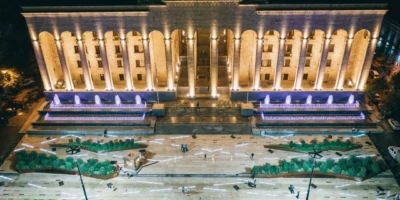Translated by Adrian Baden
47-year-old civil servant Nana Malashkhia stood with a European Union flag opposite a water cannon during a protest against a foreign agent’s law in March 2023. In December 2024, 16-year-old Taekwondo champion Salome Kenchiashvili jumped over jets of water and broke through a special forces cordon, entering a mob of cops during a pro-European protest. In the past few years, women have become the face of the Georgian protest. Despite repeated uses of special forces and equipment, they’ve remained on the front lines, revealing their extreme courage.
Such resilience has forced authorities to be inventive; while they fight men with brute force, other methods have been necessary for female activists.
“You’re a total wh*re.”
“You suck **ck?”; “Look how many wh*res,”; “I’ll put a finger in your a**.” These are just a few of the insults women heard during a February 2nd protest by the Tbilisi Mall.
Representatives of non-government organizations tell of earlier instances, though. According to Transparency International and the European Orbit of Georgia, special authorities used brute physical strength and threatened rape and murder while detaining protestors during pro-European protests in December.
One of the first women to speak up about the threats of sexual harassment was Beatris Gazdeliani. A clip of her breaking through the police cordons with her foot on Rustaveli Avenue went viral online. Beatris had come to the protest that day to support a friend who had been arrested a couple of days earlier, but after the woman pushed past special forces’ shields, she was also detained.
Beatris spoke to a journalist later about the unpleasant incident during her interrogation. In her words, one of the policemen said to her, “We know about you, that you’re a stripper, you’re a total whore.”
“I have no clue why they said this to me, I sat there shocked, not knowing what to do. It was horrible to hear all that. They were probably trying to make me nervous or blackmail me!”
Although physical and psychological threats to women had already been recorded by numerous people, the pinnacle of this violence was on February 2nd, when cases of insults and obscene attacks by police were rampant.
At the start of the protest by the Tbilisi Mall and during the ensuing march on Rustavli Avenue, law enforcement used vulgar language and threatened protestors with rape.
“‘You suck **ck? They give you 100 lari, I’ll f**k you for 101. I’ll f**k you in every hole.’ These are just a few of the words these maniacs said to me,” wrote Salome Kamladze on her Facebook page.
Another woman who had decided to stop for a snack with a friend during the start of the protest heard a policeman say, “How much can you fit in your mouth at one time?” According to Keti Kurasbediani, authorities had already been rude, but on February 2nd, they were especially horrible.
“When I passed by the police officer, he said to me and another girl, ‘I’m going to f**k you in the a**!’”
Not all instances were insults alone, according to human rights activists. Since the spring of 2024, NGOs have documented at least four instances of sexual violence against women by police during protests. The perpetrators haven’t been identified in any of the cases.
“I was forced to undress completely.”
Another type of violence and psychological pressure that protestors are increasingly reporting is a personal search requiring undressing. One of the first people to speak about this type was Kristina Botkoveli, also known as Nancy Voland, a founder of the Daitove group, which organizes demonstrations. Authorities came to her apartment on February 1st.
It first came out during the search that the protestor needed medical help due to a difficult emotional background. Later, Voland said that police made her strip naked that day.
“Two female police officers came to my house and demanded a personal search–the first psychological violence was when they ordered me to fully strip,” Voland wrote on February 6th. According to her, authorities forced her to squat like that.
The woman stated that she intends to “step back from the political process for a bit and unwind.”
Former Georgian public defender Nino Lomdzharia responded to Nancy Voland’s post. She’s convinced that what happened to the activist is far from a unique experience. According to the ex-ombudsman, women previously reported that they were made to “completely undress and forced to squat like that during interrogations and searches.”
“It’s very difficult for women to talk about these facts publicly, for their family members to hear about it, it’s very painful. Often victims prefer to just forget about the experience.”
Lomdzharia also noted that similar actions by the police that “amount to torture, dehumanization, and degradation are prohibited.”
A protester from the January 13th rally outside the restaurant Babilo, where a corporate Georgian judge party was being held, also said that she was ordered to fully strip in a detention center. In a February 7th interview with TV Pirveli, she admitted that she didn’t think it was illegal, assuming it was a typical procedure, although it was “very invasive” and “unpleasant.”
According to Baia Pataraia, director of the human rights group Sapari, since the beginning of the pro-European protests, they’ve repeatedly received complaints from women of threats and insults by police. Lately, protestors are mentioning these personal searches more:
“Women are coming forward with complaints that they’re being humiliated and intimidated. They’re being forced to strip and squat for searches. There’s no reasoning behind this except psychological torture.”
Pataraia added that authorities have the necessary equipment, such as what’s used in airports, to not stress women out. According to human rights activists, the only aims of these searches are to humiliate and intimidate the people protesting.
Physical Violence
Women protesting are facing more than just psychological terror. There have been multiple cases of physical force used against them. An attack by these so-called “tisuhki”, assumed to be connected to Georgian Dream, was recorded by a TV Pirveli film crew on the eleventh day of protests. The journalist Maka Chikhladze was attacked from behind the back by a masked man on live TV, the reporter literally being thrown aside.
The police standing nearby didn’t react at all to the violence and left together with the “titushki.” Despite a case being opened and about two months passing since the incident, no one has been brought to justice.
Another one of these cases of physical violence against women was reported by the Transparency International organization. According to the NGO, one protestor with marks on her face said it was from the police beating her.
Natia Leverashvili, a camerawoman for Publica publications, was subject to physical and psychological violence by authorities on February 4th. She had been covering a rally outside the parliament building during the spring session’s opening, where people were once again demanding that Mzia Amaglobeli be released. The footage shows the moment when a police officer grabbed Natia by her hair as protestors were already leaving.
Thousands of Fines and Charges
Despite only one woman in Georgia facing criminal charges, many women have been charged with administrative offenses. Take Mariam Sichinava, a member of the Droa! Party who has been charged with numerous fines since the start of the pro-European protests. They combined add up to 26,000 GEL (about 9,300 USD).
The woman has been fined on several occasions for using fireworks, laser devices, and masks, which are now banned during demonstrations. After the introduction of the repressive laws, Sichinava has been called into court in Zugdidi almost every week. According to the activist, she will reject the laws of the illegitimate parliament and refuse to pay the fines.
Among those facing administrative charges include Georgian jazz star Nino Katamadze. She and eight other people were charged with violating the rules of holding demonstrations outside the house of Judge Malkhaz Okropirashvili in Kutaisi. Okropirashvili refused to consider an appeal against Mzia Amaglobeli’s imprisonment as a preventative measure.
On February 10th, the Kutaisi City Court ruled all nine people were guilty and charged each of them with a 5,000 GEL (about 1,800 USD) fee.
Mzia’s 30-Day Hunger Strike
The Batumlebi and Netgazeti founder’s case is still the loudest in Georgia. For over 30 days, she’s protested with a hunger strike.
Amaglobeli was detained on January 12th during a Batumi protest where she slapped the local police chief, Irakli Dgebuadze. The woman said that earlier, Dgebuadze had repeatedly insulted her and even spat on her face. The journalist is facing four to seven years in prison.
After her health declined, Amaglobeli was taken to the Vivamed Clinic, continuing her hunger strike there. Despite her refusal to eat, doctors are bringing food and setting it by her bed. According to human rights activists, only starving people are offered food, so if the medical staff brings it to her, this is just another form of psychological pressure.







